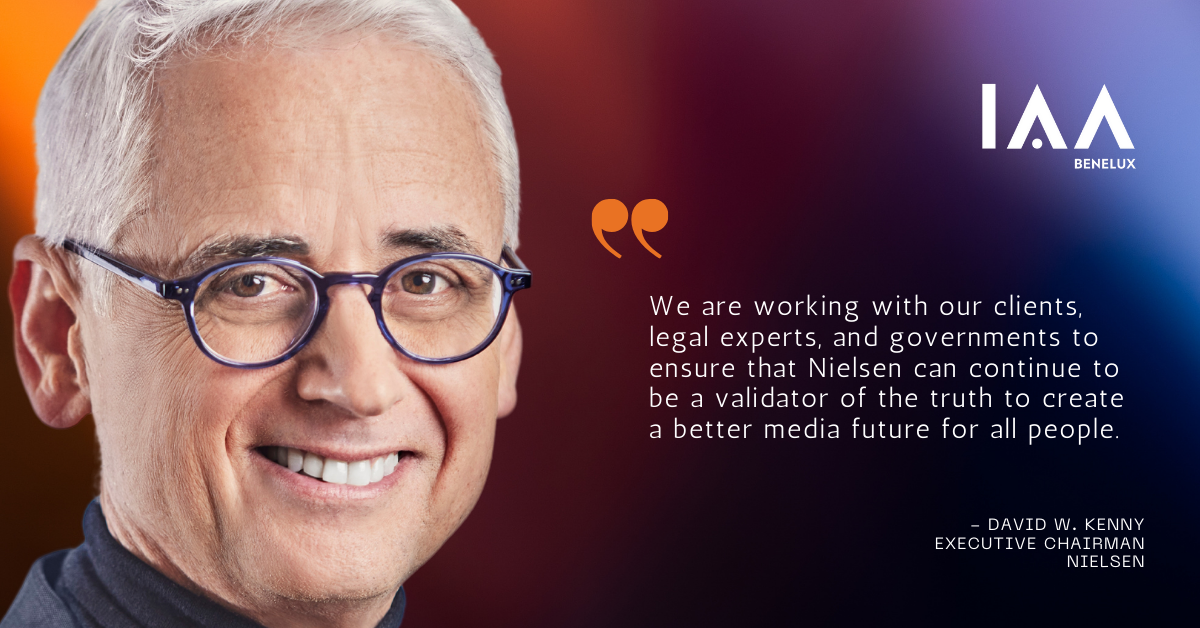David Kenny is a transformative leader and Executive Chairman of Nielsen, globally recognized for his pioneering work at the intersection of technology, data, and business. With a wealth of experience garnered from senior roles at IBM, Akamai Technologies, and The Weather Company (an IBM Business), Kenny is renowned for his groundbreaking contributions to artificial intelligence (AI) and data analytics. Under his guidance, Nielsen has witnessed remarkable growth and innovation, solidifying his reputation as a visionary in the industry.
IAA Benelux taps into Kenny’s vision of the future of data-driven decision making, and how he sees both Nielsen and the industry embracing the transformative power of AI.
IAA Benelux: Has the recent evolution of AI changed anything within your organization?
Kenny: For Nielsen, AI is not recent just because there has been a new breakthrough in Generative AI Transfer models. Earlier neural network models enable us to better identify the content people are watching for our Gracenote business, and to assess the attention paid to advertising in our Ratings business. We are looking at Generative AI to provide more personalized service to our panelists and clients around the world.
IAA Benelux: What do you see as the risks of AI for your organization and for the industry as a whole? What is your organization’s role in mitigating those risks?
Kenny: Democracies depend on citizens trusting media, especially news. And the economics of great entertainment depend on a respect for copyright laws. So we are very concerned about AI creating false narratives or violating copyrights in creating new entertainment. We are working with our clients, legal experts, and governments to ensure that Nielsen can continue to be a validator of the truth to create a better media future for all people.
IAA Benelux: How do you ensure responsibility over AI-systems used within your organization?
Kenny: We have a cross-functional team of data scientists, technologists, product managers, and intellectual property and privacy lawyers who work together to ensure that Nielsen uses AI responsibly. This group regularly reports out to the CEO and Board of Directors.
IAA Benelux: What do you see as the opportunities for the use of AI?
Kenny: As I mentioned before, there are a wide range of AI models across both neural networks and now GPT models. We use the right model for the right use case — inductive models are best for estimating a discrete fact, like the size of an audience or the cast of a movie. Deductive models are best for applying a probability to an event, like the outcome of an advertising campaign. Generative models are best for creativity and conversation, so we will use these in customer service. Nielsen is also responsible for trust in media, so we are working on how to validate content produced by others using generative AI.
IAA Benelux: Do you see the industry using AI for the collective good? How are the regulations around AI, such as the EU AI Act impacting your business in the EU and abroad? Do you see these regulations as opportunities or threats?
Kenny: I think it is very hard for all the players in an industry to agree on collective objectives, unless they are aligned via a regulatory framework. Joint Industry Committees in many countries have enabled good self-regulation and alignment in broadcast media, but it’s been harder to extend these to digital platforms. AI needs to cover all forms of media to be helpful. In Europe, the AI Act is a good framework to help the industry align especially since it follows the European Media Freedom and Digital Services Acts. Nielsen has a team dedicated to engaging with policy and lawmakers in Brussels, Washington, and other capitals. We play an important role in ensuring compliance with regulations to enable trust and stability as new technologies are used.

